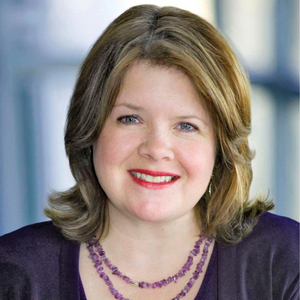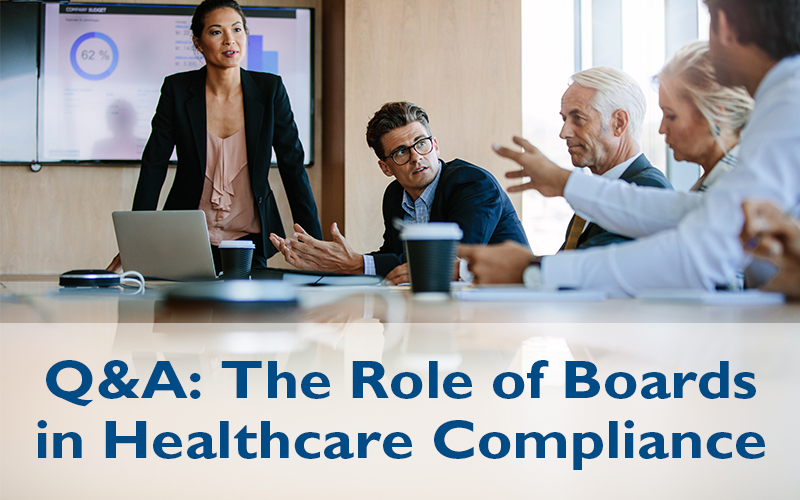Q&A: The Role of Boards in Healthcare Compliance

Jennifer Gimler Brady, Partner and General Counsel at Potter Anderson & Corroon LLP presented the webinar “The Role of Boards in Healthcare Compliance.” Ms. Gimler Brady returned to answer many commonly asked questions.
What are some of the biggest risk areas for health care organizations, and what role does the board play with regard to those risks?
Health care organizations operate in a highly regulated environment. Some of the most significant areas of exposure for health care organizations are billing and documentation, information technology and data security and privacy, and health care quality. A board exercises its oversight function when it assesses areas of risk for the health care organization, including obtaining and reviewing information from internal and external sources, and evaluates the effectiveness of the organization’s compliance program.
Is it important for board members of health care organizations to have backgrounds and experience in health care operations?
It’s helpful for board members to have a basic understanding of the environment in which the health care organization operates, but it is not necessary for board members to have direct experience in health care operations. Boards typically are comprised of individuals with a wide variety of professional backgrounds: finance, law, real estate, and human resources, for example. Having a board member with a health care compliance background would be beneficial and could send a powerful message about the organization’s commitment to compliance. But all board members should have an interest in and curiosity about health care compliance, including a willingness to learn about the organization’s operations, ask probing questions, and seek expert guidance when necessary to assist the board in fulfilling its oversight responsibilities. Boards can’t claim ignorance or lack of expertise.
Is it the board’s responsibility to develop a health care organization’s compliance plan?
It isn’t the responsibility of the board to develop the nuts and bolts of an organization’s compliance plan. That is a management function. But the board reviews, approves and oversees the compliance plan to ensure that it’s effective, and the board sets the tone for the organization in terms of creating a culture of compliance, where everyone in the organization understands that compliance is a priority and is non-negotiable.
What are some key things a board should look for to assess whether an organization’s compliance plan and culture are effective?
The board should periodically probe such things as:
- are compliance issues being reported, and if not, are there impediments to reporting;
- if issues have been reported, have they been investigated, and if substantiated, what steps has the organization taken to address the issues;
- are there trends in the issues being reported;
- are individuals in the organization receiving training on the compliance program and specific compliance topics;
- is the compliance program effective and are any revisions or updates recommended.
The board should obtain updates from informed staff during regular meetings, attend outside training programs, and retain outside advisors, with a goal of understanding the business climate well enough to ask the right questions of management to make well-informed decisions for the organization.
 Jennifer Gimler Brady is a partner with Potter Anderson & Corroon LLP, where she also serves as the firm’s General Counsel and heads the firm’s Labor and Employment and Health Law practices. Jennifer regularly advises clients on a wide variety of healthcare compliance issues, as well as labor and employment matters. In addition, Jennifer participates in professional and community organizations, including the American Health Lawyers Association, the American Health Care Association, the Delaware State Chamber of Commerce, and the Wilmington Friends School Board of Trustees.
Jennifer Gimler Brady is a partner with Potter Anderson & Corroon LLP, where she also serves as the firm’s General Counsel and heads the firm’s Labor and Employment and Health Law practices. Jennifer regularly advises clients on a wide variety of healthcare compliance issues, as well as labor and employment matters. In addition, Jennifer participates in professional and community organizations, including the American Health Lawyers Association, the American Health Care Association, the Delaware State Chamber of Commerce, and the Wilmington Friends School Board of Trustees.
Be sure to check out Jennifer Gimler Brady’s webinar and explore our other online resources, such as our online compliance training courses, compliance posters, and our complimentary webinars and podcasts.


I try to provide an educational article to my Compliance and Audit Committee of the Board at our quarterly meetings. I would love to provide a copy of this to our board members. May I and how best to obtain a nice copy for printing?